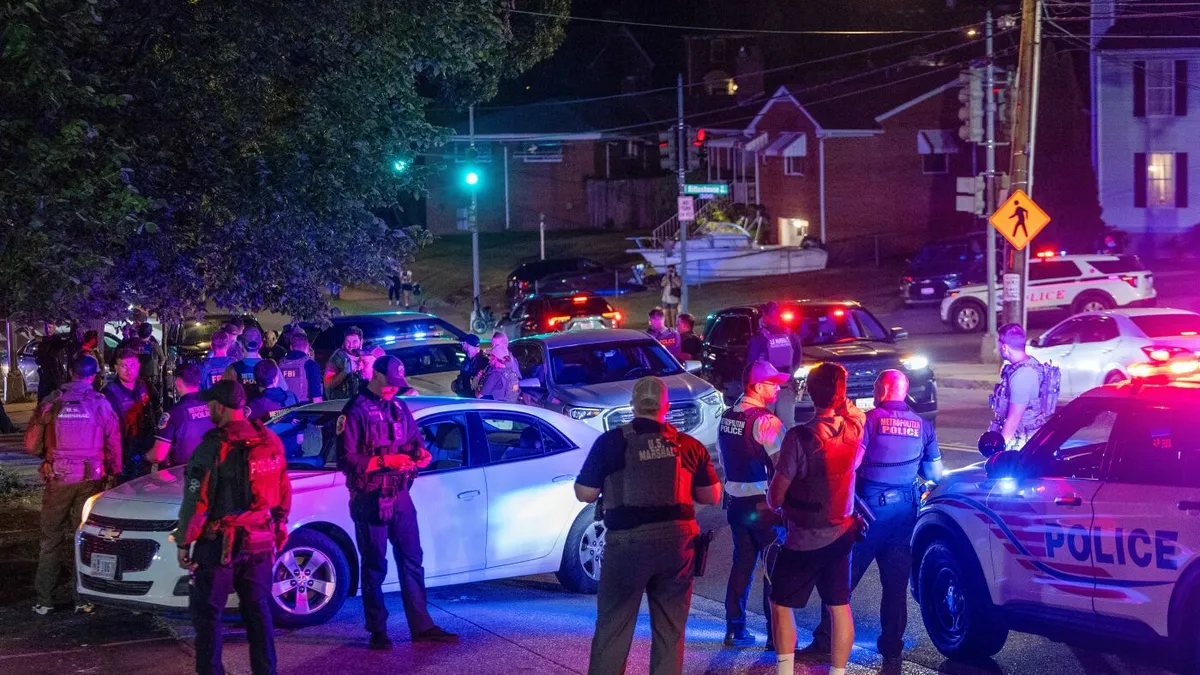
Washington, D.C. is currently witnessing a significant military presence on its streets, as President Trump deploys soldiers and masked federal agents for a second consecutive week. Addressing the situation at the Kennedy Center, Trump acknowledged that many Americans fear he has crossed a perilous line, stating, "Already they're saying, 'He's a dictator.' The place is going to hell, and we've got to stop it." Instead of labeling him a dictator, he urged citizens to support his efforts to restore safety in the capital.
The motivations behind Trump's decision to militarize law enforcement in D.C. are complex. This move has seen hundreds of National Guard troops and federal agents deployed, as Trump attempts to take control of the Metropolitan Police Department amidst claims of rising crime. Historically, Trump has made crime—particularly involving young Black men—a core element of his populist agenda, dating back to his days as a prominent real estate developer in New York City.
Trump has often painted urban areas, including D.C., in stark, dystopian terms. In his inaugural address in 2016, he highlighted the struggles of mothers and children trapped in poverty and vowed to end what he termed "American carnage." However, critics argue that the current crackdown in D.C. is based on misleading assertions about a crime crisis, with Rosa Brooks, a former D.C. Metropolitan reserve police officer, asserting, "There is not a crime crisis in D.C. This is police state territory."
While Brooks acknowledged that Washington has faced significant crime issues in recent years, a study by the Rochester Institute of Technology identified D.C. as having the fourth-highest murder rate among 24 major U.S. cities. Nonetheless, this analysis also indicated a notable decline in crime, with violence hitting a 30-year low last year. When Trump took office for his second term in January, D.C. was experiencing a decrease in both homelessness and drug overdose deaths.
Brooks expressed concern that Trump's use of a fabricated crisis to justify military presence on the streets is alarming. She warned of a normalization of armed federal personnel engaging with civilians, stating, "That's just truly scary."
In contrast, administration officials characterize the law enforcement surge as a demonstration of decisive leadership. White House spokeswoman Taylor Rogers stated that over 300 "dangerous criminals" have been apprehended since the military presence began, framing this as Trump fulfilling his campaign promise to "clean up" D.C. However, federal officials have yet to clarify how long this military deployment will last or what will happen to the city's vulnerable populations—such as the homeless and mentally ill—who are being displaced from the streets.
Social service advocate Dana White pointed out that the issue of homelessness is not being effectively addressed, as D.C.'s shelter capacity is often insufficient, leaving many without stable housing options.
Some legal experts suggest that Trump's emergency powers in D.C. may expire 30 days after his executive order was signed on August 11. However, Republican lawmakers in Congress have shown little inclination to limit his authority. One Republican representative even jokingly suggested extending Trump's power indefinitely.
Complicating matters, U.S. Attorney General Pam Bondi attempted to install the head of the Drug Enforcement Administration as the emergency police chief, a move that was met with resistance from D.C. Attorney General Brian Schwalb, who successfully challenged this power grab in federal court.
In a further escalation, Republican governors from Ohio, South Carolina, and West Virginia have pledged to send additional National Guard troops to D.C. Some of these units may be armed, marking a significant shift from the unarmed presence that has been typical near major tourist sites. As tensions rise, questions loom about the potential for violent confrontations and the implications for community safety.
Trump has occasionally suggested that a strong law enforcement response is necessary, saying that police should be allowed to exercise tough measures. However, local leaders are eager to prevent violence akin to past incidents in Ferguson and Minneapolis, hoping to maintain calm in the community.
Rev. Ronald Bell Jr., a leader in one of D.C.'s predominantly Black congregations, emphasized the importance of community resilience. During a sermon, he reminded congregants of their shared history and strength, stating, "When it seems like the armies have come and taken what was yours, you know where to go." Bell expressed confidence that local leaders have learned from past experiences and are prepared to manage the current crisis.
In an open letter, Mayor Muriel Bowser described the first week of Trump's emergency measures as a crisis, acknowledging the anxiety felt by residents. She urged the community to remain united and assured families that together, they could navigate through this challenging time.
As the situation unfolds in Washington, D.C., the actions of both federal and local leaders remain under scrutiny, with many hoping for a resolution that prioritizes safety without compromising civil liberties.